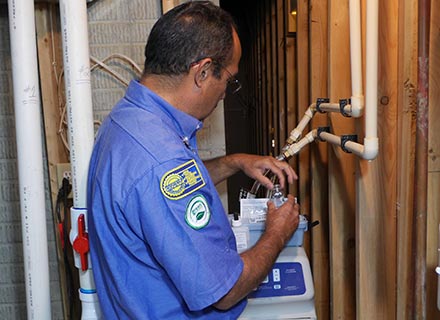Garbage Disposal Leaking Causes
Problems with your garbage disposal can be a real pain. Especially if it starts to leak and you’re not sure what the problem is. The leak itself is easy to fix but there are several places that could be the source. There are many different inlets, outlets, seals and rings, something could crack at any time.
Here are some of the most common reasons a garbage disposal will spring a leak:
Sink Flange
The sink flange is found in the uppermost area of your garbage disposal. Look at the area where the sink's drain intersects with the disposal. There are several reasons why it can leak from here:
- Make sure that all mounting bolts are there and have been secured tightly. A loose bolt is one of the most common reasons why your garbage disposal is leaking. Fortunately, tightening a bolt or even replacing it, is fairly simple.
- The other thing you need to check is if the plumber’s putty needs to be replaced. To do this you will have to loosen the retaining bolts and create a gap. Once the gap is visible, squeeze some new putty into the area between the pipe and the flange. Re-tighten the bolts and the putty will stay in place.
Dishwasher Connection
Another place to check is the connection of the drain to the dishwasher. This connection removes the leftover food from your dinner plates when they are washed. It is common for leaks to occur in the hose that connects the disposal to the dishwasher. Leaks will also occur if the hose clamp is not secured tightly enough.
This is an easy fix if you tighten the clamp onto the hose or, if necessary, replaced the cracked section of the hose.
Discharge Pipe
Also, check the discharge pipe that is found at the bottom of the garbage disposal. This pipe goes into the sink drain and is connected with a seal and a flange. Both of these pieces can become loose or fall apart after a lot of wear and tear. First, try tightening the flange. If it continues to leak, replace the seal between the retaining nut and the discharge pipe.
Crack in the Disposal Body
As your disposal system is used and becomes older, the body of the system may crack along the interior shelf and water can begin to leak along the seams. This is not a good sign and means that the entire system needs to be replaced.
Unit is Knocked Loose
Units are typically located under the kitchen sink where most people also store cleaning products or other household items. It’s not uncommon for people to knock into the unit when they are under there looking for something. It is possible to bump into it hard enough to knock the unit of out place.
Check and make sure that none of the pipes have been moved or seals haven’t been pressed in. Even check the retaining bolts to see if they are loose. Tighten all the bolts and check and see if the leak continues. If this doesn’t fix the leak, try replacing the putty or the sealing ring.
Precautions to Take
DO's
• Run a full flow of cold water each time you grind, before and after.
o Also let the water continue to run for another 30 minutes when you are done with the disposal. This keeps fats from becoming solid and prevents them from clogging the disposal. The water also keeps your motor cool as it is running and prolongs the disposal’s life.
• Only put soft particles of food in your disposal as hard items such as bones can damage the unit.
• Make sure to check for leaks periodically. The areas where leaks can exist can also grow mold and attract insects which you also want to avoid.
• Routine maintenance is also necessary:
o Annual maintenance: Make sure to grind up ice cubes once a year to sharpen the blades. This will also help remove odor-causing food that may become trapped.
o Monthly maintenance: Pour baking soda and vinegar into the disposal to remove and food build-up and help your unit smell better.
o Let the mixture sit for one hour then wash it down with hot water but do not turn on the disposal.
Don’t's
• Never put your hand down the disposal! The blades are sharp, even when it’s not turned on, and can possibly cut you when they aren’t even moving.
• If you want to rid your disposal of odors, don’t use bleach, it can damage your unit. Use baking soda and vinegar or citrus peels instead.
• Be careful not to let dish rags falls into the disposal. They can jam up the impeller inside your unit.
• Avoid overfilling the unit. This can make your disposal work harder than usual and ultimately damage the unit's motor.
• Make sure your disposal is done grinding before turning it off and then let cold water run for a few more seconds to flush everything out.
• Finally, do not put grease, eggshells or potato skins in your disposal. These types of things can build-up in your pipes. Pasta and rice can clog up your pipes as well.
Last but not least, do not use your disposal like a trash can. It is highly important that you only use bio-degradable type food in your disposal.
Check the Connections
Always make sure to check all connections on your unit. If there is no humming sound and the unit is not working at all, check the plug and see if the circuit breaker has been tripped. If that is all working properly, check and see if the “reset button” at the bottom of the unit is out and push it back in. If none of these things works, your motor is probably broken and needs to be replaced.
Inspect for Possible Cracks
If you’re looking for possible cracks, these are the areas that you need to find and check out:
• Sink Flange Leaks – check for a loose bolt and if you need to apply more plumber’s putty.
• Air Break / Dishwasher Connection Leak – if you notice the side of the disposal is wet, then check the air break connection or the dishwasher connection.
• Discharge Drain Pipe Leak: this is can also be indicated if the side of the unit is wet. If the previous connections are fine, then check the connection to the discharge drain pipe.
• Water leaking from the bottom through the motor – this can indicate a leak with the flywheel seal and into the motor.
Garbage disposal leaks are a nuisance but if you check your seals and connections, you should be able to find the source and fix it. Just keep an eye out for future leaks and keep up your maintenance to make sure your unit has a long lifespan.
Clogged drain problem? Call Kellie Plumbing, Inc. at (317) 738-2707 for reliable Franklin drain cleaning services. Fixed right or it's free!



